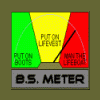It's not a matter of whether or not I think my local protocols are the end all/be all of how things are done, nor do I have a problem 'thinking outside of the box'; I can't even chalk this one off to 'reading too much into the question.
The issue I'm having is that there's the PHTLS way, the BTLS way, the Mosby way, the NAEMT way, the NREMT way....ad infinitum.
Let's all get on the same page here and come up with a single way of doing things, answering questions and treating our patients based on the evidence that we uncover during our exams (be it trauma/medical/focused/rapid etc).
Answering test questions based on the idea of trying to figure out just what the producer of the exam wants to hear equates in my mind to nothing more than 'cookbook medicine'.
To me, having certain criteria that has to be met before we can just "call 'em dead" is the only logical method I can think of. When we come to the scene of a cardiac event, do we simply pronounce the patient 'dead' because we can't get a pulse or because the monitor shows asystole in only one lead? Absolutely not! We look further int the situation (asystole confirmed in at least 2 leads). Even then, it's not a guaranteed fact that the patient is dead and thereby negating any attempts to resuscitate.
What got my dander up is the way it was dismissed with the statement "It's the PHTLS answer". Yes, in my opinion, it SHOULD have been handled better, and at least offered WHY this was the correct answer.
My local protocols; hell, even the STATE protocols are FAR from what I would consider the model for a national scope of practice, s there's no 'disappointment' involved.
If the course material is going to overlap from several different general categories, (ACLS, PALS, GEMS, PHTLS, etc), shouldn't the modalities of treatment also be overlapping? Or do you advocate treating the patient based on whatever modality you choose at the moment? If so, then by what criteria would you base that decision on?






